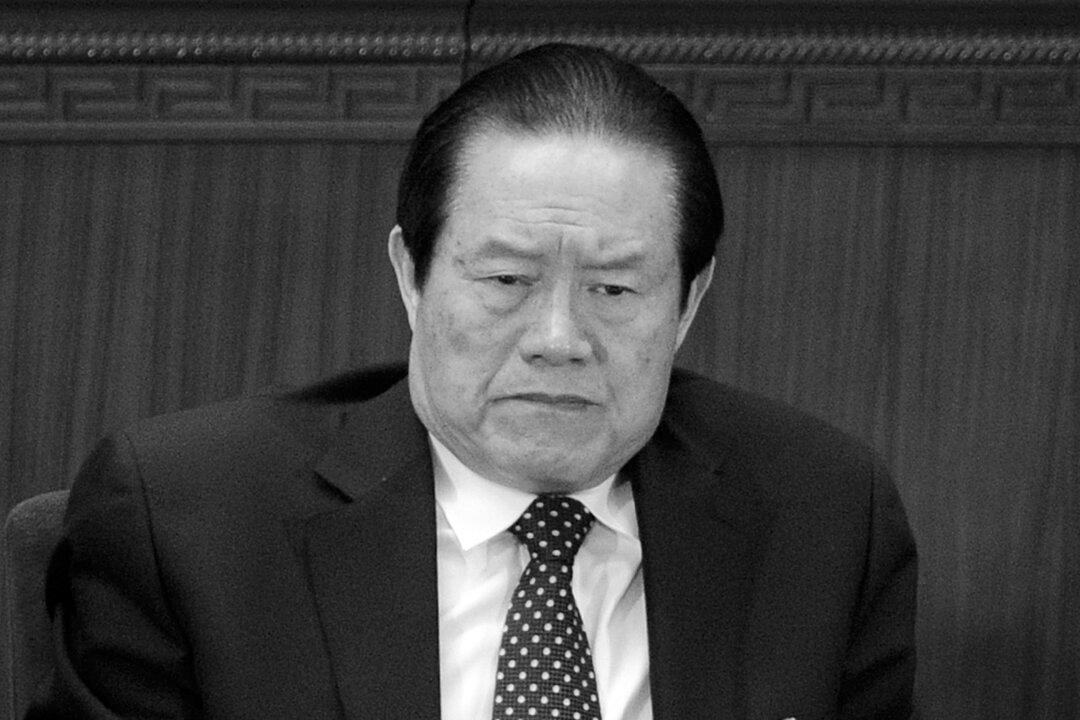Xinhua, the mouthpiece of the Chinese regime, announced on midnight on Dec. 5 that the Party’s former security czar, Zhou Yongkang, was being expelled from the Chinese Communist Party for a long list of crimes.
Zhou, Xinhua said, “gravely violated the Party’s political discipline,” phraseology that encompasses criminal acts, as well as a variety of immoral conduct.
The announcement that Zhou is to be expelled from the Party comes just over four months after it was announced that he was under investigation, on July 29. That notice, in turn, followed nearly two years of speculation and expectation that Zhou was in the cross-hairs of Xi Jinping, the General Secretary of the Party, for his staunch support of the purged Politburo member Bo Xilai, and reported conspiracy with Bo to oust Xi in the late 2012 leadership transition.
The drama goes even further to May 2012, when Epoch Times reported that then-Communist Party leader Hu Jintao had agreed to an investigation of Zhou Yongkang. Given Zhou’s high rank in the Party, an investigation that might lead to arrest had few precedents.
Zhou’s expulsion from the Party paves the way for him to be handed over to judicial authorities, who will orchestrate a show trial aimed at attempting to demonstrate that even purged Party officials are accorded a modicum of due process in China.
In fact, less than an hour after the announcement, the Supreme People’s Procuratorate, the Party’s top prosecutor’s office, said that it had already arrested Zhou Yongkang and set up an investigation into the charges against him.
The list of Zhou’s transgressions as provided by Xinhua was particularly long. It included: using his power to render benefits to others; embezzling, sometimes through family members, “vast sums of money;” abusing his power to help relatives, lovers, and friends gain “huge benefits,” while causing great loss of state assets; seriously violating clean government and self-discipline, receiving enormous bribes for himself and family members; engaging in numerous adulterous relationships with women, and exchanging authority for sex. The investigation into Zhou also found leads into the crimes of other officials, it said.
The notice continued: “Zhou Yongkang’s actions completely violate the principles and characteristics of the Party, seriously violate Party discipline, have dealt enormous damage to the reputation of the Party, and have had an extremely vile influence on the common enterprise of the Party and the people.”
The Communist Party’s Politburo Standing Committee, the chief power organ consisting of seven sitting members, including Party boss Xi Jinping, was said to have heard a preliminary report about Zhou’s crimes prepared by the Central Commission for Discipline Inspection, the Party’s anticorruption agency, on Dec. 1, 2013. Subsequently, the Politburo heard the Commission’s report, and then began the formal investigation that led to the current conclusion.
Zhou’s expulsion signals that Xi has almost completed his work of the last two years to entirely dismantle the political network of former leader Jiang Zemin. Although Jiang was only officially in office from 1989 to 2002, he and his close clique—chief among them his security czar Zhou—continued to wield the real political and economic power in China for over two decades. That group’s power is now effectively broken—though observers are still waiting for the final nails in the coffin.
Many of the items on the list of Zhou’s crimes are standard fare for corrupt officials, and such a robust litany of offenses should come as no surprise for an official of Zhou’s stature. But one line seemed unusual: “divulging Party and state secrets.”
The rest of the notice does not make further reference to which secrets Zhou was alleged to have divulged, or to whom. Earlier in the year the veteran Chinese journalist Gao Yu, who was recently released from prison, hinted that Zhou may have been involved in an alleged leak of information about the fortunes of the Xi Jinping family, when Xi was still vice chairman of the PRC, to Bloomberg News. Bloomberg, and Michael Forsythe, the reporter who worked on the story and is now an employee of The New York Times, denied this was the case.
There is, however, no doubt that Zhou, as top security official of the Party, would likely have been in possession of the most sensitive secrets of the Party and its inner workings.
Gao Yu wrote: “A breakup with Zhou Yongkang, who has all the secrets in his hands, would completely turn the tables. For Xi Jinping to dismantle the entwined network of Zhou Yongkang, he must have the same resolve with which the Gang of Four was apprehended and with which Mao Zedong eliminated Lin Biao.”
The Gang of Four was the political faction on whom the Cultural Revolution was blamed after their purge.
Gao Yu continued: “The day when Xi succeeded in taking down Zhou would be the day he had truly taken control of the Party and consolidated his power.”





